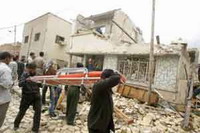Rescuers search for bodies under remains of UN offices in Algiers bombed by al-Qaida affiliate
Rescuers are still searching for the dead and alive under the crumpled remains of U.N. offices in Algiers bombed by an al-Qaida affiliate. Victims included U.N. staff from around the world, police officers, law students who had been on the way to school when the bombers struck.

The Interior Ministry said 31 were killed in Tuesday's twin truck bombings, as the official death toll slowly mounted. Initial reports elsewhere had much higher figures, though the government insisted it had no reason to conceal the full scale of the horror.
Rescue work Wednesday was focusing on five or six people who were in the basement of one U.N. building at the time of the attack and who could still be alive, said the chief of the emergency team on site, Djamal Khoudi.
Earlier in the day, seven survivors were pulled out from beneath chunks of concrete, Khoudi said. One 40-year-old woman was transferred to a military hospital where she had both legs amputated, he said.
The attacks - and their targeting of the United Nations - drew swift international condemnation. Islamic insurgents have been battling Algeria's government for 15 years, but have largely focused on symbols of Algeria's military-backed government and civilians. The other target of Tuesday's attack was Algeria's Constitutional Council.
U.N. Secretary-General Ban Ki-moon urged all nations on Wednesday to stand united against terrorism, calling it "the scourge of our times."
"This attack on the U.N. is an attack on us all and our highest ideals," he said in a live video address from Bali, Indonesia, to the 192-member General Assembly. He said the United Nations will not be deterred in its mission "to help those most in need."
It was the worst single attack against U.N. staff and facilities since August 2003, when the global body's headquarters in Baghdad were hit by a truck laden with explosives. That attack killed 22 people, including the top U.N. envoy, Sergio Vieira de Mello, and was blamed on a group that later affiliated with al-Qaida.
At least 11 U.N. workers, possibly more, were killed in Algiers, U.N. officials said. Five of the dead were foreigners, the Interior Ministry said: a Danish man, a woman from the Philippines, a man from Senegal and two people from China. Three other foreign U.N. employees, two from China and one from Lebanon, were hospitalized, the ministry said.
Four police officers who were guarding the Constitutional Council were among the dead, according to police at the site Wednesday.
Two law students were also killed, said law professor Rachid Ourari, choking back tears. "They were preparing for the bar," he said.
Pink-jacketed emergency workers delicately navigated the rubble at the U.N. offices while sniffer dogs scampered alongside. Families of the missing stood nearby outside police cordons, waiting for news of their relatives.
Workers for a private company housed in the same building tried to save documents and computer equipment.
Police helicopters circled overhead, moving from the old port section of town to the tony neighborhood where the U.N. offices and Constitutional Council were targeted.
Residents of Algiers gathered around newspaper kiosks Wednesday, some expressing surprise that the official death toll was so much lower than that reported elsewhere.
A national official at the civil protection agency said Wednesday 45 people were killed. Soon after the bombings, a doctor said at least 60 were killed, and Algeria's independent daily El Watan reported up to 72 killed and 200 wounded.
A major Algerian hospital held a blood drive Wednesday, and dozens of people lined up to give blood for those injured.
"Algerians are completely united against terrorism," Algerian Foreign Minister Mourad Medelci said on France's Europe-1 radio, insisting that the attacks did not portend "civil war."
Asked about the possibility of attacks elsewhere in North Africa, he said: "It's everyone who is targeted, sooner or later."
Ban Ki-moon called for an immediate review of U.N. security in Algeria and elsewhere.
The U.N. offices are in the upscale Hydra neighborhood of Algiers, which houses many foreign embassies. The U.S. and British embassies stepped up security warnings. The French Embassy said that though violence had largely died down in recent years, "recent attacks show that it is time for a return to the most extreme prudence."
"The renewed threat by al-Qaida against French interests in North Africa cannot be ignored," the embassy said on its Web site.
Al-Qaida has called for attacks on French and Spanish interests in North Africa.
Saudi King Abdullah told Algerian President Abdelaziz Bouteflika that the "terrorist acts will only increase the determination of the Algerian government and the people to uproot terrorism and eliminate it," the official Saudi Press Agency reported.
Al-Qaida's self-styled North African branch claimed responsibility in a posting on a militant Web site. Al-Qaida in Islamic North Africa - formerly known as the Salafist Group for Call and Combat, or GSPC - described the U.N. offices as "the headquarters of the international infidels' den."
Algeria's insurgency broke out in the early 1990s, when the army canceled the second round of the country's first multiparty elections to prevent likely victory by an Islamic fundamentalist party. Islamist armed groups then turned to force to overthrow the government, with up to 200,000 people killed in the ensuing violence.
Subscribe to Pravda.Ru Telegram channel, Facebook, RSS!


